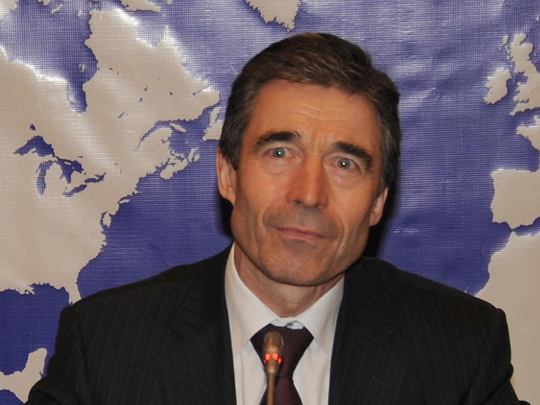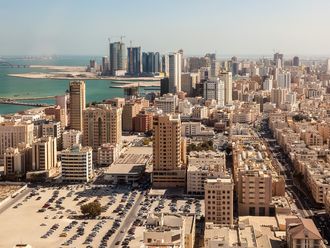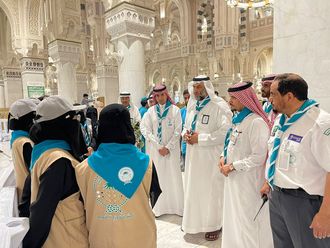
Nato Secretary-General Anders Fogh Rasmussen has highlighted the "important partnership" between Nato and the Gulf members of the Istanbul Cooperation Initiative (ICI), saying that the alliance and the Gulf countries had to confront common security threats.
"We face common challenges and threats, such as failed states, terrorism, the proliferation of weapons of mass destruction, piracy and energy security," Rasmussen said in Manama. "These are all security issues that cannot be successfully tackled by any one country alone. They require a multilateral and cooperative approach to security, including through the Istanbul Cooperation Initiative. Therefore it is clear that the security of Bahrain, and of all our ICI partner countries, is of strategic interest to Nato," he told a gathering of diplomats, journalists and think tank members.
Rasmussen, who was elected to the post last year, said that Nato and the GCC had "a shared interest in helping countries like Afghanistan, Kosovo and Iraq to stand on their own feet again, and in preventing countries like Somalia, Yemen and Sudan from slipping deeper into chaos."
Instability that could be caused by Iran’s nuclear ambition in the region that is pivotal for global stability and security is also a serious source of concern, he said.
According to the Nato chief, energy security is an additional area where common interests and concerns have become more and more apparent and the alliance and the Gulf states highly interdependent.
"It was because of these common threats and challenges that the Istanbul Cooperation Initiative was launched, almost six years ago. Since then, our partnership has gone from strength to strength, defying the sceptics who said that a strong relationship between Nato Allies and Gulf States was impossible," he said.
For Nato, the exchange of information and best practices on energy security issues should be stepped up for the sake of energy and maritime security.
Steps include establishing concrete procedures for management of environmental accidents, particularly that last summer Nato offered ICI countries direct access to a dedicated Brussels-based centre, and an adequate protection of the computerised control system that regulates and oversees critical energy infrastructure.
"Another key element of energy infrastructure that needs protection is the means of transportation. Approximately 15 tankers a day pass through the Straits of Hormuz, carrying about 17 million barrels of crude oil. This represents almost 40 per cent of the world seaborne oil shipments – but most significantly from a Gulf States’ perspective, it represents 90 per cent of the oil exported from the region. There is a direct link between energy security and maritime security," Rasmussen said.
Nato is currently conducting two maritime operations, Active Endeavour, a counter-terrorist operation in the Mediterranean, and Ocean Shield, a counter-piracy operation off the Horn of Africa.
"I should like to offer our ICI partners the possibility of participating in Nato maritime operations in the region. This does not have to be necessarily with ships. There are other ways of contributing to these operations, such as with support in the fields of information, logistics, or exercises," he said. "We will then need to develop an effective web of contacts between our naval commands. Nato’s maritime commands, in Northwood in the United Kingdom, and in Naples in Italy, and the naval commands here in Bahrain, and in our other partner Gulf States," he said.












